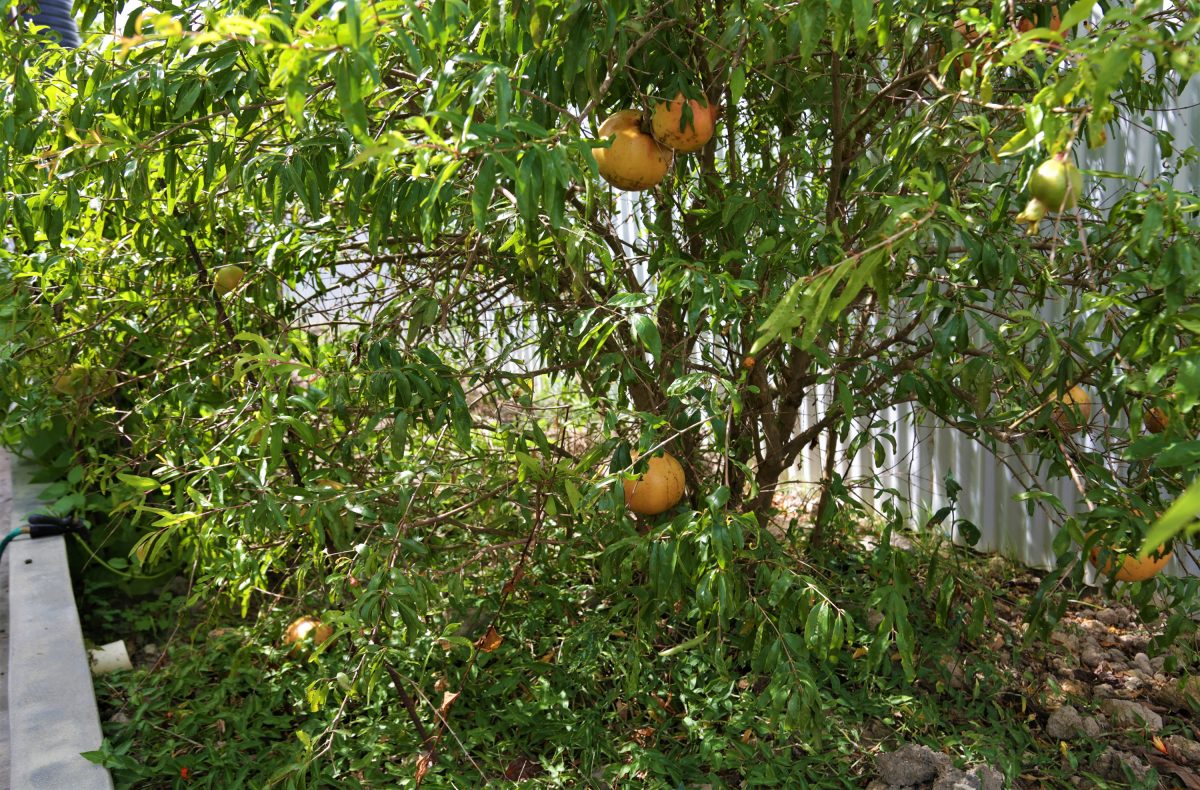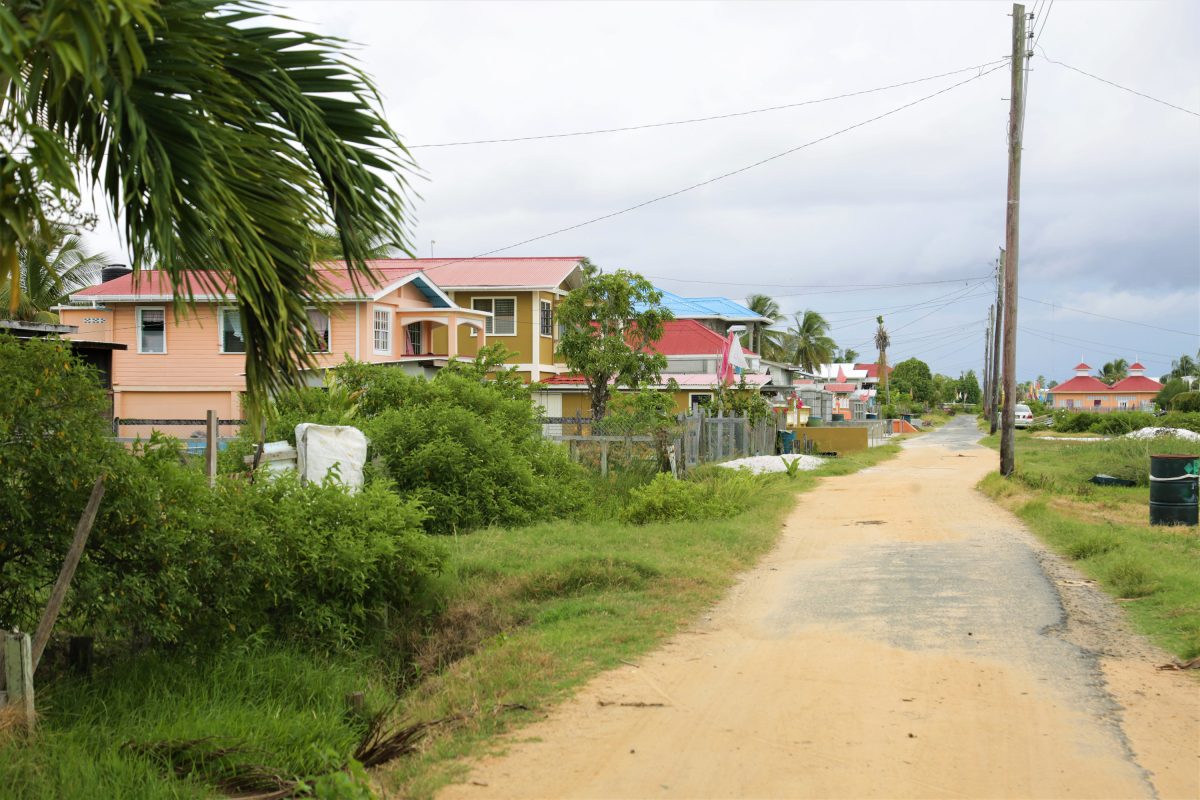Richmond Housing Scheme on the Essequibo Coast has been in existence for more than 30 years and a haven to the 1,000+ people who made it their home over the years. Built on rice fields, the housing scheme is bordered by Henrietta and La Belle Alliance.
Seulall (only name given) was inside his house with his four boys. He enthusiastically nominated his neighbour Bibi Husman as the best person for me to speak to before calling his sons outside to pose for a photo on a tyre swing they had made themselves.
“I came here in 1988, so almost 31 years since I’ve come here and the community was very, very poor,” Husman told me. “It didn’t have streets, just tracks. In 1992 after Dr Cheddi Jagan take over, he establish the new housing scheme here, before it was the old housing scheme. We had light but we never had water. We used to go till to Anna Regina, it had a pump station right where the car park at and that’s where we used to get our water from; or we depend on the rain.
“After 1992 we do self-help and we clean the streets them. We had black sage that was hanging all over. We had a trailer we full with black dust that we get from the paddy shell and we full up the street them. In 1994 Bharrat Jagdeo visit us, at that time Asgar Ally was finance minister, and promise us that he would give us the pipelines and we dig from the main road into the scheme and GWI set up the lines them. We run the pipes into two streets, and we put three standpipes that people could get water. Till in 1998 time they start making the new scheme and start bulldoze and make streets and so the place develop. It didn’t have a nursery school. SIMAP give us the nursery school. Me and one Mr Mohamed Ayube, who has since passed away, had applied to SIMAP for a nursery school. My children went to that school.”
The woman also pointed out that prior to receiving the standpipes, they depended on the water from the nearby canals for just about everything. Today, however, the canals are a sad sight, so clogged with foliage that the water cannot be seen.
Years ago, she said, Richmond was prone to flooding and any light showers flooded the place. While the scheme doesn’t flood so easily now, if the rains come and the koker is closed, taking into consideration the clogged canals, Richmond will flood. One reason the scheme flooded was that it was built on rice fields that were set up for irrigation. Many persons, including Husman, have since filled up their land with truckloads of mud and sand to avoid the floods. Although Husman has concreted her yard now, the water still covers her concrete during the rainy season.
Husman has been working with the Anna Regina Town Council for three years now. She said she has made proposals on behalf of her community, including requests for better drainage and roads but explained that not everything can be handled by the town council; some are under the regional administration’s jurisdiction and should be fixed by the Regional Democratic Council. Another issue that is still to be dealt with is the presence of animals on the roadways. Husman said that they have spoken to residents on numerous occasions and sent out flyers asking them to keep their animals off the road to no avail. She further posited that because it is a residential area, persons should not be rearing the animals.
Husman wishes for a recreational facility and ground for the youths in the area. She is assisting her son with her two grandchildren who recently lost their mother. Earlier this year, her daughter-in-law, Farena, gave birth to a baby boy, who was hospitalised because it was said that he had ingested fluid from his mother’s womb. Farena was already discharged and was awaiting the discharge of her baby boy. Husman said she seemed her normal self and they only worried about the baby. However, she soon began complaining of shortness of breath and was admitted to Intensive Care, where she died.
According to Husman, the doctors said that her death was due to several heart attacks. The family was shocked as earlier that day Farena had told them that all was well and both she and baby were expected to be discharged the following day.
Husman shared that at first it was hard for her to deal with a newborn all over again and having to relearn jumping up to the cries of a baby in the night. But it did not take her long to fall back into the familiarity of motherhood. Today baby Shahid is six-months-old and he shares a home with his grandmother, sister Safia, father and great-grandmother.
Nauthley Harry sat in her hammock on the verandah surrounded by her grandchildren. Originally from Coffee Grove, three villages away, Harry moved to Richmond Housing Scheme 15 years ago on December 24. She has found it to be a quiet and friendly atmosphere.
Persons rely on farming, mining, driving and their
various office jobs. Her sons are labourers and they plant rice but after planting season, they do odd jobs.
Harry lives in the new scheme part of Richmond. Together the old and new schemes share five streets. At the time she moved in, she had no electricity, but this was supplied not long after. A member of the Universal Church in Anna Regina, Harry said the village has no churches but has a temple as many of the residents are Hindus.
Harry, who is a caterer, is self-employed. She has been doing this since 1991 and caters for weddings, birthdays and other special events. It was through her business that she was able to secure her home years ago. Her peak seasons are August and December when there are usually numerous weddings. She also sells fruit juice and because of where she lives, she often does not have to purchase fruits as her neighbours have trees laden with them.
Two sorrel trees brighten the yard with their red blossoms. “They should be ready in time for Christmas to make sorrel wine,” Harry said. “Christmas time here is very nice. The masqueraders would come around, there is a lot of food and the neighbours are always visiting each other, sampling each other’s food, cakes and wines. From small my parents don’t cook on Christmas Day so that remained a tradition with my family. We still bake and so, so there is always things to eat but the big cooking is left for Boxing Day. That’s when you would have family coming over.”
She shared that for years she dealt with floods, which reached as high as her knees. Over the last 15 years, Harry said, she has purchased more than 100 truckloads of dirt and she is still in need of more. At the beginning, she paid $3,000 per truckload but now a load is $6,000 while a load of sand is $10,000. The woman further said that since the sand is coming from nearby at Mainstay, she should be paying less.
Carol Gittens’ yard has some of the most beautiful potted plants you will ever see. The parapet of her yard is covered with loads of sand already leveled out as part of a revetment. Once it is settled, she plans on concreting the parapet like she has done with her yard.
Now retired from working with the regional administration, Gittens is basking in her retirement. A mother of four, she raised her children single-handedly and now that they are all grown, they assist the woman who sacrificed a lot to make life better for them.
Pointing out her beautiful plants, Gittens shared that where she grew up in Henrietta, her family always kept a kitchen garden and a farm in the backdam. Farming, she said, has always been a part of her life, something she finds therapeutic; sometimes night finds her in her garden. Among her flower plants she has several fruit trees including one from which huge ripe pomegranates hung, some touching the ground.
Living in Richmond Housing Scheme, she said, is wonderful and she lives a comfortable life, but her mind could never be at ease because of the abandoned house next door that is overrun by weeds. The house, she noted, can become a haven for vagrants and a habitat for reptiles. The owners of the property have died and while their children recently came from Venezuela, they moved on to Georgetown.
She locks up at 6.30 pm every day as a precaution though she mentioned that the community is relatively safe. Some streetlights in the village would do a lot of good especially for persons working the night shifts, Gittens said.
She has an adult son with a disability whom she takes care of and aside from that, basic chores and planting, Gittens spends time knitting. On Sundays, she attends the Holy Trinity Anglican Church in Anna Regina, which is 20 minutes away on foot or less than five minutes by taxi.












